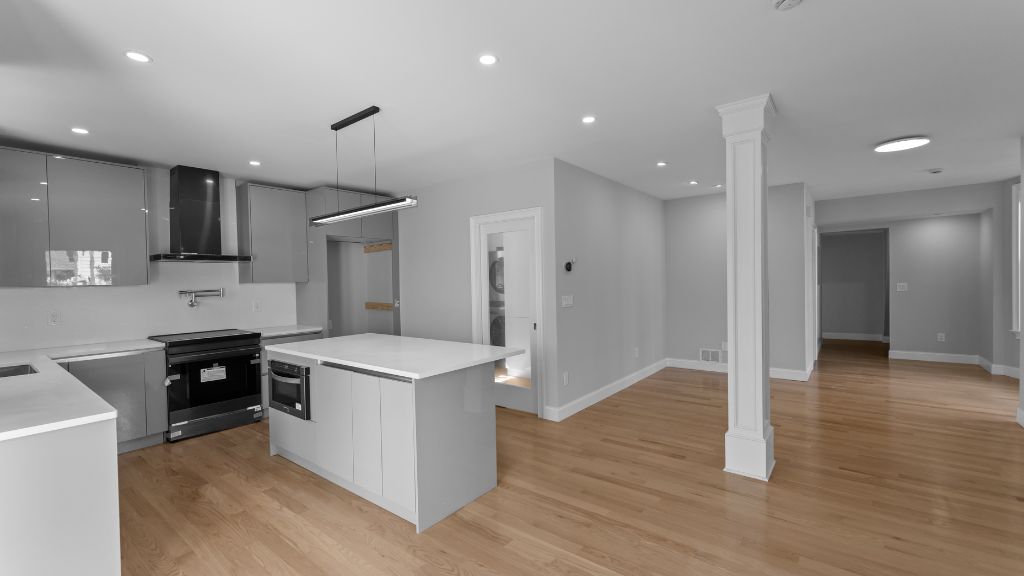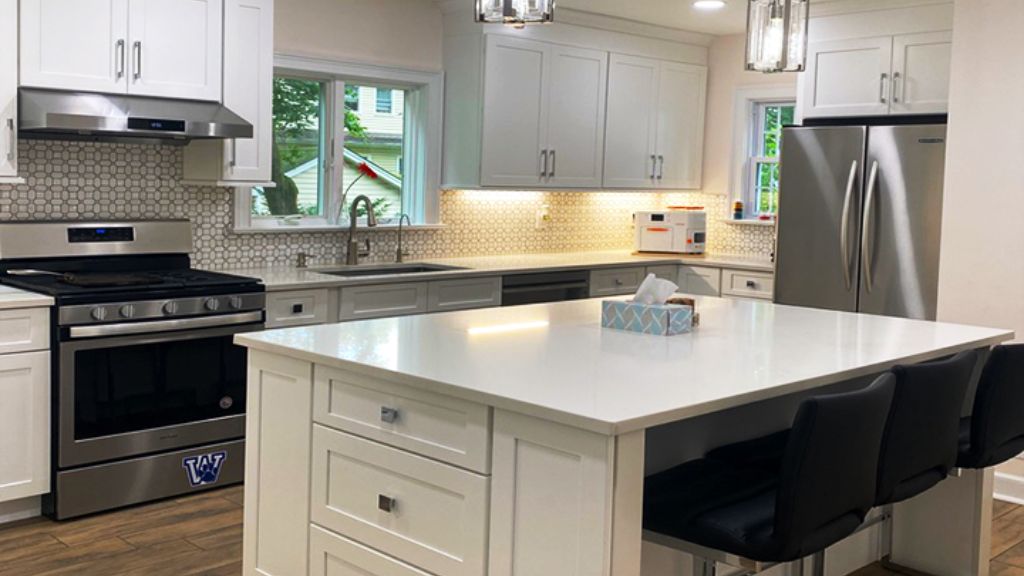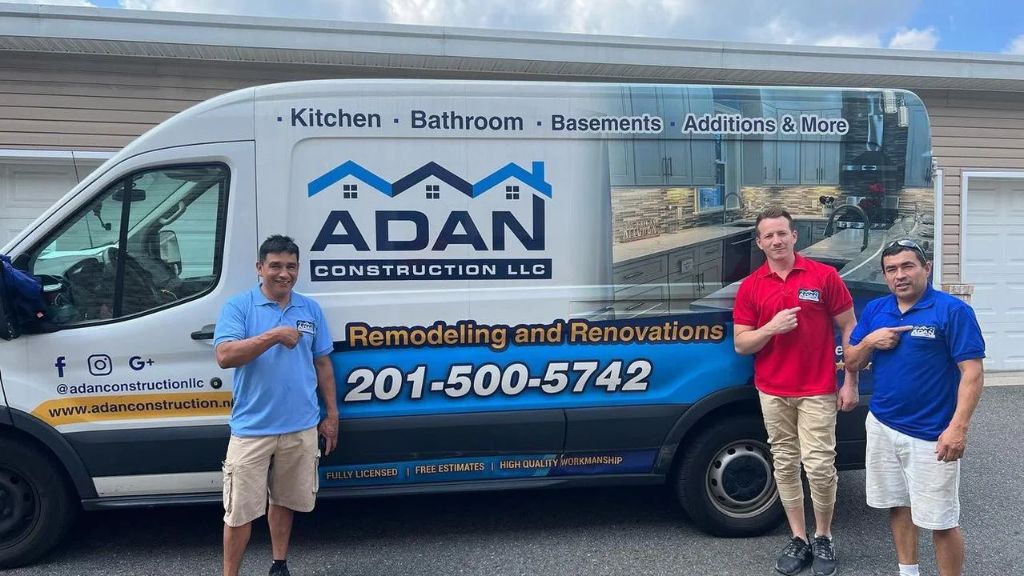Starting a kitchen remodel can feel overwhelming, but with proper planning and a clear kitchen renovation timeline, transforming your space becomes manageable.
Whether you're considering a budget kitchen remodel or a full kitchen renovation, understanding the essential steps—from setting your kitchen remodel budget to selecting the right contractors—will ensure your project runs smoothly.
This comprehensive guide covers everything you need to know about how to start a kitchen remodel, including planning strategies, timeline expectations, and expert tips to avoid common pitfalls while creating your dream kitchen.

Before diving into any kitchen renovation project, defining your goals and establishing a realistic budget forms the foundation of successful kitchen remodeling. A full kitchen remodel can cost from under $10,000 to over $100,000, making budget planning crucial from the outset.
Start by asking yourself why you're remodeling your kitchen. Do you need more storage space, better functionality, updated appliances, or simply want to modernize the aesthetic? Understanding your primary motivations helps prioritize spending and ensures your kitchen remodel timeline stays focused.
Key budget considerations include:
On average, a kitchen remodel can range from $12,000 to $60,500, everything from minor touch-ups in smaller spaces to extensive renovations. Create a detailed spreadsheet listing all anticipated expenses and add a 10-20% contingency fund for unexpected issues that commonly arise during kitchen renovations.

The layout phase represents one of the most critical steps in how to start a kitchen remodel successfully. Your kitchen's functionality depends heavily on the work triangle concept the efficient placement of your sink, stove, and refrigerator.
Begin by measuring your current space accurately and creating a scaled floor plan. Consider whether you'll maintain the existing layout or reconfigure the space entirely. Major layout changes typically require moving plumbing and electrical systems, significantly impacting your kitchen remodel budget and timeline.
Popular kitchen layouts to consider:
Galley Kitchen: Ideal for narrow spaces with parallel countertops
L-Shaped Kitchen: Maximizes corner space and provides good workflow U-Shaped Kitchen: Offers maximum storage and counter space
Island Kitchen: Creates additional workspace and storage while serving as a focal point
Open Concept: Removes walls to integrate kitchen with living areas
When planning your design, think about current kitchen trends for 2025 while ensuring your choices have lasting appeal. Smart appliances, sustainable materials, and multifunctional islands are increasingly popular. However, prioritize functionality over trends to ensure your remodeled kitchen serves your family's needs long-term.
Understanding realistic timeframes prevents frustration and helps coordinate various aspects of your renovation. According to a 2020 U.S. Houzz & Home study exploring renovation trends in 2019 and 2020, kitchen remodeling projects took, on average, 8.3 months of planning time and 4.5 months of actual construction time.
Typical kitchen remodel timeline phases:
Planning and Design (2-4 months): Goal setting, budgeting, design development, permit applications, contractor selection, and material ordering Pre-Construction (2-4 weeks): Final preparations, material deliveries, and site setup
Demolition (3-5 days): Removing old cabinets, appliances, flooring, and fixtures Structural Work (1-2 weeks): Plumbing, electrical, and any structural modifications
Installation Phase (4-8 weeks): Drywall, flooring, cabinets, countertops, and appliances
Finishing Touches (1-2 weeks): Painting, hardware installation, and final details
Several factors can extend your timeline, including permit delays, custom cabinet lead times, appliance availability, and unexpected structural issues. Delays are common in remodeling projects. Build some flexibility into your timeline and budget to account for unforeseen issues.

Choosing qualified professionals significantly impacts your kitchen renovation's success, timeline, and final quality. Start your contractor search early, as reputable professionals often book months in advance.
Essential team members for kitchen remodeling:
When evaluating contractors, request multiple detailed quotes, check references from recent projects, verify licensing and insurance, and review their portfolio of completed kitchen renovations. Quality contractors will provide comprehensive written estimates breaking down labor, materials, and timeline expectations.
Ask potential contractors about their experience with projects similar to yours, their approach to handling unexpected issues, and how they manage project timelines and communication. The lowest bid isn't always the best choice—consider experience, reputation, and communication skills alongside pricing.
Most kitchen remodels require various permits, especially when moving plumbing, electrical systems, or structural elements. Permit requirements vary by location, but common permits include electrical, plumbing, building, and mechanical permits for ventilation systems.
Your contractor typically handles permit applications, but understanding the process helps ensure compliance. Permit costs usually range from $100-$500 per permit type, depending on your location and project scope.
Common inspection points include:
Factor permit processing time into your kitchen remodel timeline, as approval can take 2-6 weeks depending on your local building department's workload and project complexity.
Material selection and ordering requires careful coordination to prevent delays. Some items, particularly custom cabinets and specialty appliances, have extended lead times that can significantly impact your timeline.
Typical lead times for kitchen materials:
Order long-lead-time items first, typically beginning with cabinetry since other elements like countertops require cabinet installation for proper measurement and templating. Coordinate delivery schedules with your contractor to ensure materials arrive when needed without creating storage issues.
Consider creating a material tracking spreadsheet listing each item's order date, expected delivery, and actual delivery to maintain organization throughout the process.
Kitchen renovations significantly disrupt daily routines, requiring advance preparation to maintain household functionality. Create a temporary kitchen area with essentials such as a microwave, coffee maker, and mini-fridge to handle basic food preparation during construction.
Preparation strategies include:
Discuss daily schedules with your contractor, including start times, break periods, and cleanup expectations. Understanding the construction sequence helps you prepare for particularly disruptive phases like plumbing or electrical work that may affect your entire home's utilities.
Successful kitchen remodeling requires active involvement throughout the construction process. Regular communication with your contractor, scheduled progress meetings, and thorough documentation help ensure quality results and adherence to your timeline and budget.
Establish clear communication channels and regular check-in schedules with your contractor. Document progress with photos, maintain records of all change orders, and address concerns immediately rather than waiting until project completion.
Key quality control checkpoints:
Starting a kitchen remodel successfully requires thorough planning, realistic budgeting, and careful coordination of multiple moving parts. By following this comprehensive guide from initial goal setting through final completion you'll be well-equipped to navigate your kitchen renovation journey with confidence.
Remember that patience and flexibility are essential virtues during any remodeling project. While challenges will inevitably arise, proper preparation and working with qualified professionals will help you achieve the kitchen of your dreams within your budget and timeline expectations.
Ready to transform your kitchen? Contact (201) 500-5742, Adan Construction today for expert guidance and professional kitchen remodeling services that bring your vision to life.
1. How long does a typical kitchen remodel take from start to finish?
Most kitchen remodels take 8-12 months total, including 2-4 months of planning and design work and 3-5 months of actual construction, depending on the project scope and complexity.
2. What's the biggest mistake homeowners make when starting a kitchen remodel?
The most common mistake is underestimating the budget and timeline while failing to plan for unexpected issues. Always include a 15-20% contingency fund and build flexibility into your schedule.
3. Should I hire a general contractor or manage the project myself?
While DIY management can save money, kitchen remodels involve complex coordination of multiple trades, permits, and inspections. Most homeowners benefit from hiring an experienced general contractor unless they have construction experience.
4. When should I order appliances for my kitchen remodel?
Order appliances early in the planning phase, especially if choosing specialty or built-in models. Standard appliances typically need 4-6 weeks, while custom or specialty units can require 3-6 months.
5. How can I minimize disruption to daily life during a kitchen remodel?
Set up a temporary kitchen with essential appliances, plan meals that require minimal cooking, protect adjacent rooms from dust, and establish clear daily schedules with your contractor for work hours and access needs.